Think Twice About Traveling with Forest Destroyer H.I.S.

On October 31, 2022, H.I.S. announced that due to losses due to difficulty in procuring palm oil, it would transfer its power generation subsidiary "H.I.S. Super Power," along with ownership of this palm oil-burning power plant, to another company, Nangoku Corporation, at a loss. H.I.S. has demonstrated that biomass power generation is risky, not just environmentally but also financially, and ignored warnings from environmental groups at its own peril.
Hotels staffed by robots. A theme park in Nagasaki that recreates old Holland. Japanese travel giant H.I.S. lures international visitors to Japan with its quirky and offbeat destinations. However, there is a dark truth that potential customers should know before booking a post-pandemic trip to Japan.
H.I.S. — No Longer Just a Travel Company
How did a company with a motto of “Love, peace, travel” get caught up in one of the dirtiest energy businesses on the planet? In 2017, H.I.S. established H.I.S. Super Power to sell discounted electricity to customers in Japan.

Not content to be just an electricity middleman, H.I.S. Super Power began to build their own generation plants. They put up solar panels at their Dutch theme park in Nagasaki. Fatefully, they then invested in a large-scale power plant in Kakuda City that would burn enormous quantities of palm oil. Soaring demand for palm oil is accelerating the burning of tropical forests and their conversion to palm plantations. Japanese environmental groups informed H.I.S. of the problems with this business and even met with the company’s CEO in February 2019.
However, H.I.S. rebuffed their concerns and pushed forward with construction of the power plant. Now, in fall 2020, we are potentially weeks away from the power plant starting operation.
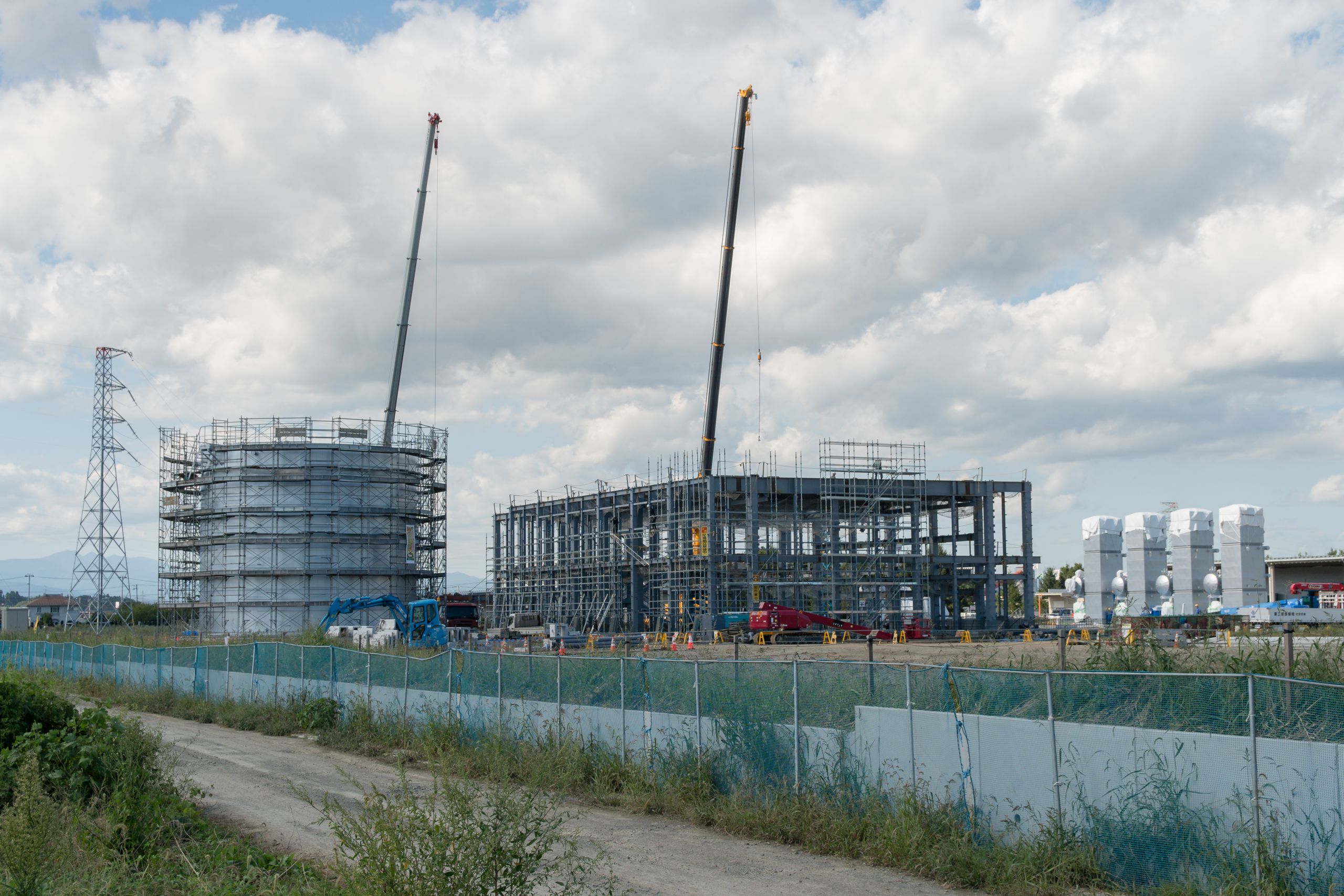
H.I.S. power plant under construction
H.I.S. power plant under construction
Palm Oil and Forest Destruction
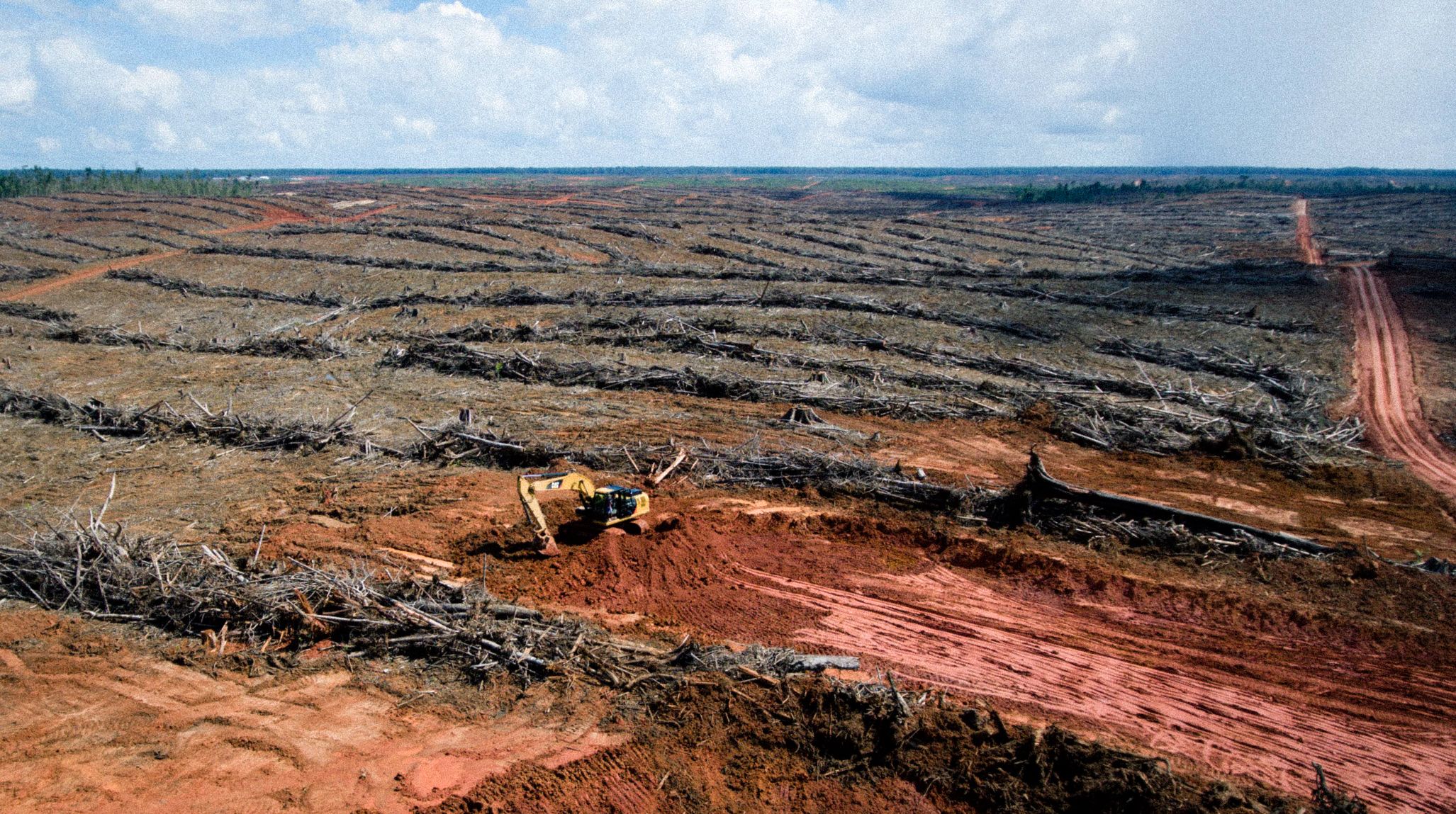
Palm oil has grown to become the world’s most popular cooking oil and is ubiquitous in packaged food, soaps, and even cosmetics. It’s the base ingredient in much of the world’s biodiesel. This rising demand has fueled the expansion of oil palm plantations, and the palm oil industry still drives about 250,000 acres of deforestation every year, an area nearly the size of Hong Kong.
Every year, thriving tropical forests in Southeast Asia with diverse species are cut down and burned to create more space available for palm, covering southeast Asia in a choking haze. Wild forests are soon replaced by a plantation with a single species, oil palm. The orangutans, tree kangaroos, and other wildlife that originally lived in the tropical forest lose their homes as do the people who have lived there for centuries. Mighty Earth documented the tragic case of the Indonesian province of Papua in a multimedia story, Burning Paradise. If built, the H.I.S. Kakuda power plant alone would import and burn 70,000 tons of palm oil every year.

Once Orangutans Roamed these Forests
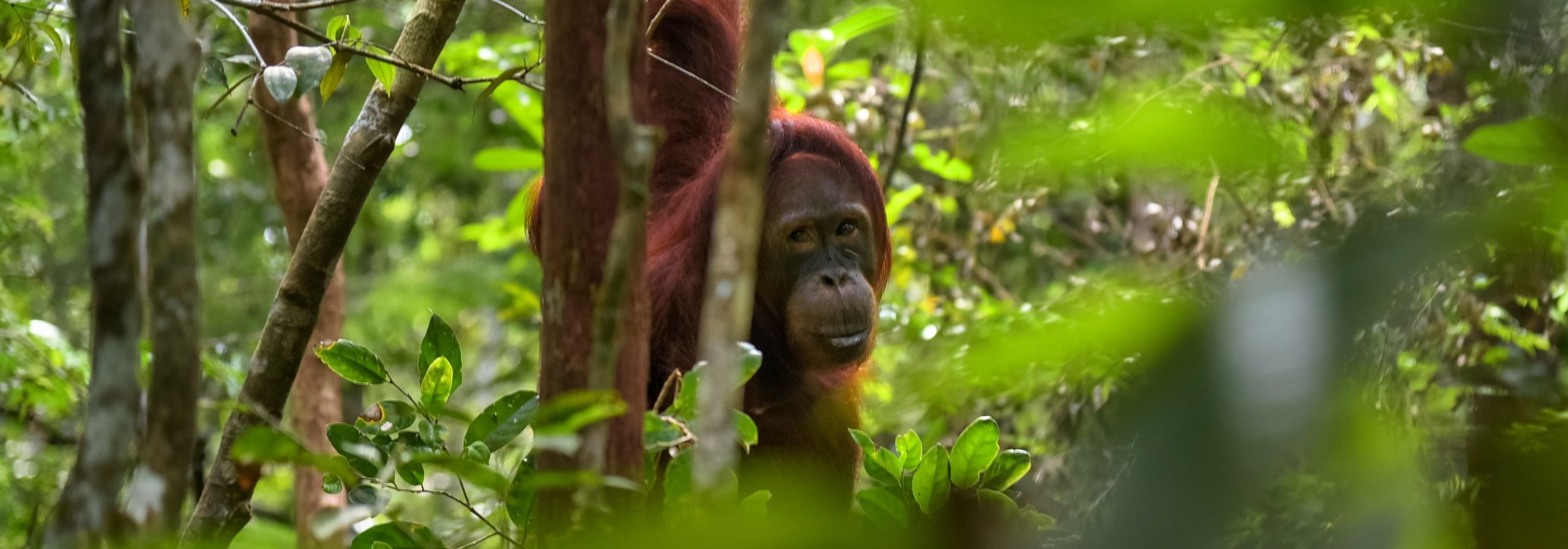
Nothing exemplifies the dark side of palm oil more than the plight of orangutans. These are intelligent apes who use tools and even create their own medicines. And they are endangered, with fewer than 115,000 remaining. The number one threat to orangutans’ survival is the expansion of palm oil plantations in the forests that are their homes. In the palm-oil-growing heartlands, you can fly in a jet several miles up in the air, look out your window, and see nothing other than oil palms stretching to the horizon in what was once orangutan habitat.

Palm-Based Energy: Dirtier Than Coal
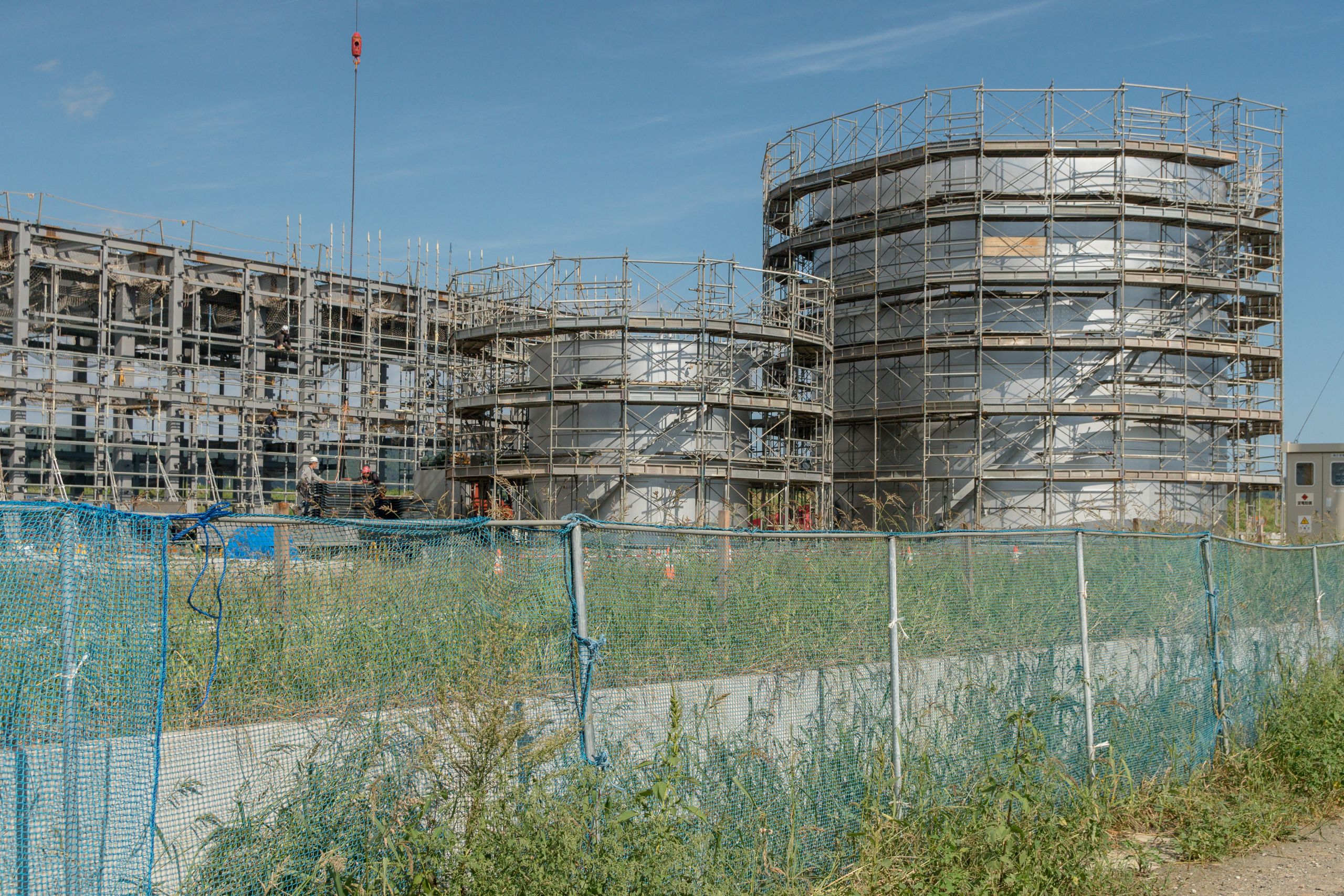
The development of tropical forests and peat lands for oil palm farmland releases enormous amounts of CO2. A large amount of methane and other greenhouse gases are also generated from the waste liquid generated in the processing stage. Taking these emissions into account over their life cycles, a palm oil power plant generates far more CO2 than coal-fired power generation.
A report commissioned by Japan’s Ministry of Economy, Trade, and Industry in 2019 showed that palm oil had similar emissions to natural gas over its lifecycle (including cultivation, processing, transportation but not emissions from combustion). However, when tropical forests are cleared, emissions increase five times, and when peatlands are developed, emissions increase a staggering 139 times- making palm oil power far worse for the climate than even the dirtiest coal power plant.

Oil palm fruits, photo by KYTan
Oil palm fruits, photo by KYTan
Green Certifications Fall Short
Palm oil is widely used for food and in products like soaps and cosmetics. Voluntary standards like the “Roundtable on Sustainable Palm Oil” (RSPO) seek to set a higher standard for how palm oil is produced but leave out important criteria.
For example, these certifications don’t address that the demand for palm oil as a fuel competes with its use in food, driving up prices and contributing to food insecurity. Supplies of certified oil are limited, with RSPO claiming it covers just 19 percent of global palm oil production. With increased demand for palm oil resulting in higher prices, there is a greater financial incentive to replace tropical forests with palm plantations. These indirect market effects which drive deforestation are beyond the scope of certifications.
Deforestation also remains a concern because RSPO (2013) only prohibits the forest clearance of "ecosystems of high conservation value" after November 2005 and it allows the development of forests other than “high conservation value,” such as secondary forests.
Additionally, RSPO certification does not limit palm oil’s impact on climate change. When forests and peatlands are developed, enormous amounts of carbon stored in trees, branches, leaves, and soil are emitted as carbon dioxide.
Even conversation organizations generally supportive of industry certifications for palm oil for food and products state that RSPO certification does not address their concerns regarding deforestation or greenhouse gas emissions.
Scarce supplies of certified palm oil would be better used in high-value products and not simply burned for fuel.
Consumer Backlash Grows into Boycott
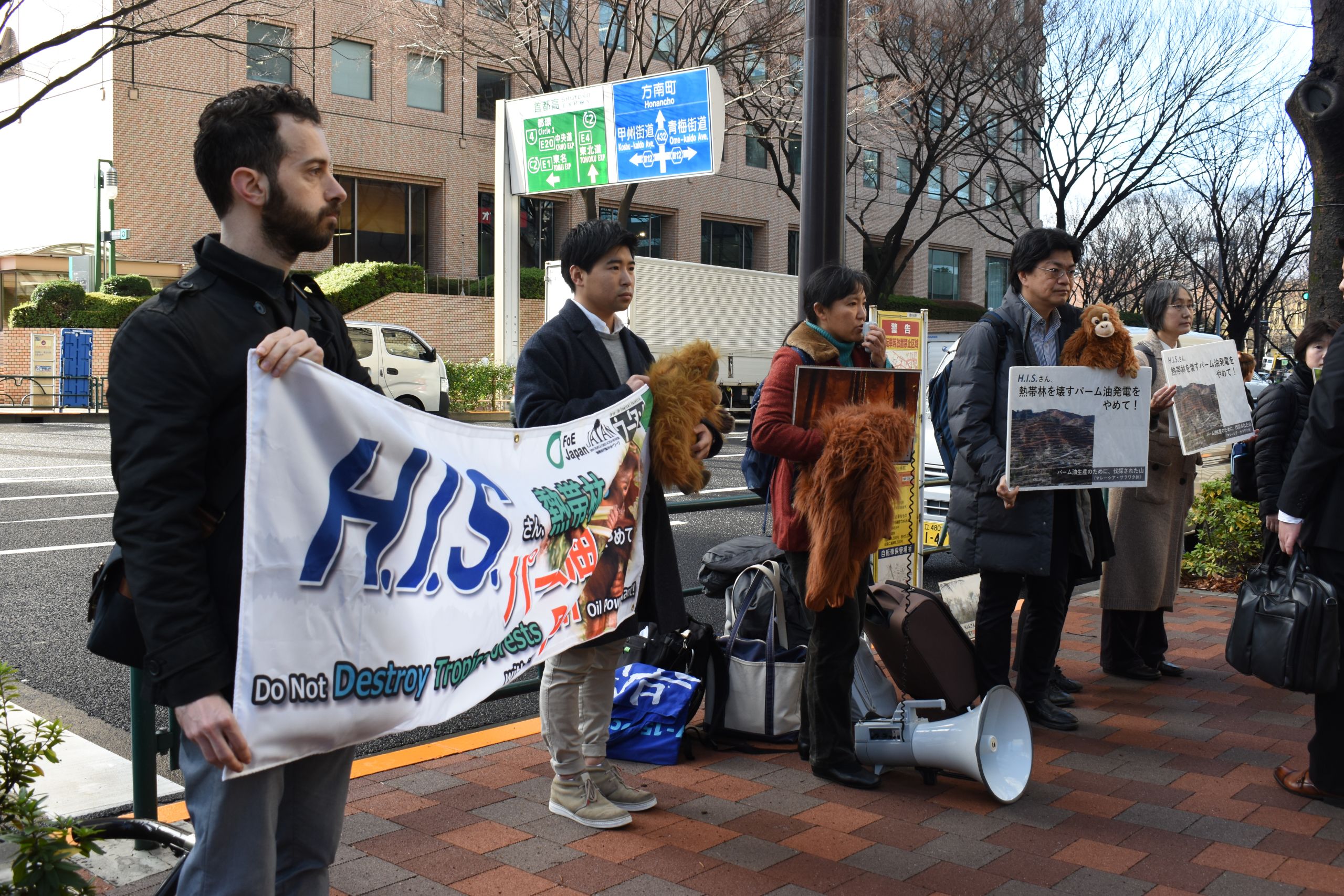
In July 2019, approximately 200,000 consumers from around the globe demanded H.I.S. protect forests by scrapping this proposed plant and getting out of the palm oil business. H.I.S. management refused to even accept the petitions.
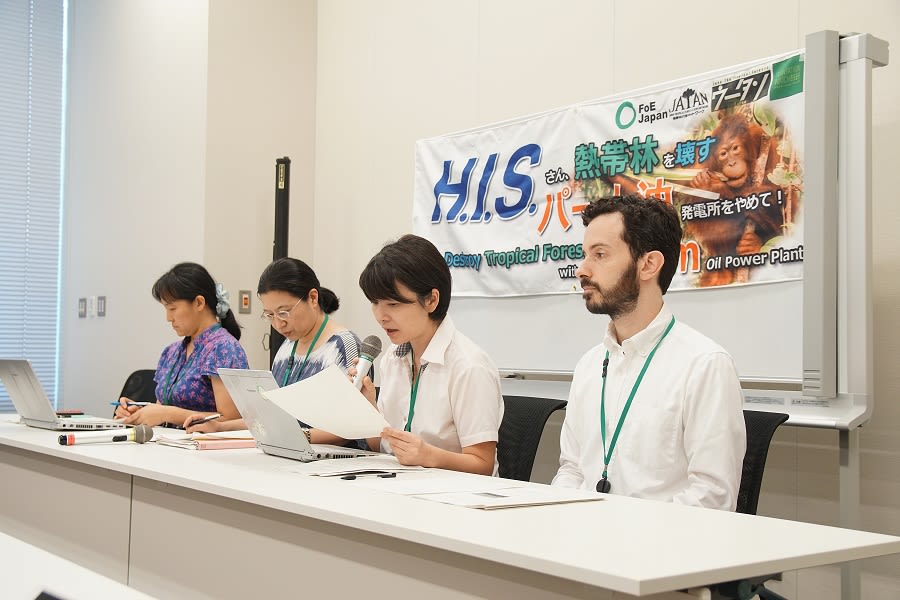
Press Conference - July 2020
Press Conference - July 2020
In the summer of 2020, in the midst of a global pandemic, potential customers contacted H.I.S. branch offices in the United States with the message that Americans will not travel with H.I.S. until they end their involvement with forest-destroying palm oil. Many Americans are eagerly planning to resume travel when the pandemic restrictions lift, and the Toyko 2021 Olympics is a massive tourist draw. Public response to Mighty Earth and its allies call to avoid travel with H.I.S. in summer 2020 received an overwhelming response, as more than 7,200 people, including many frequent travelers, pledged to refrain from booking trips with H.I.S.
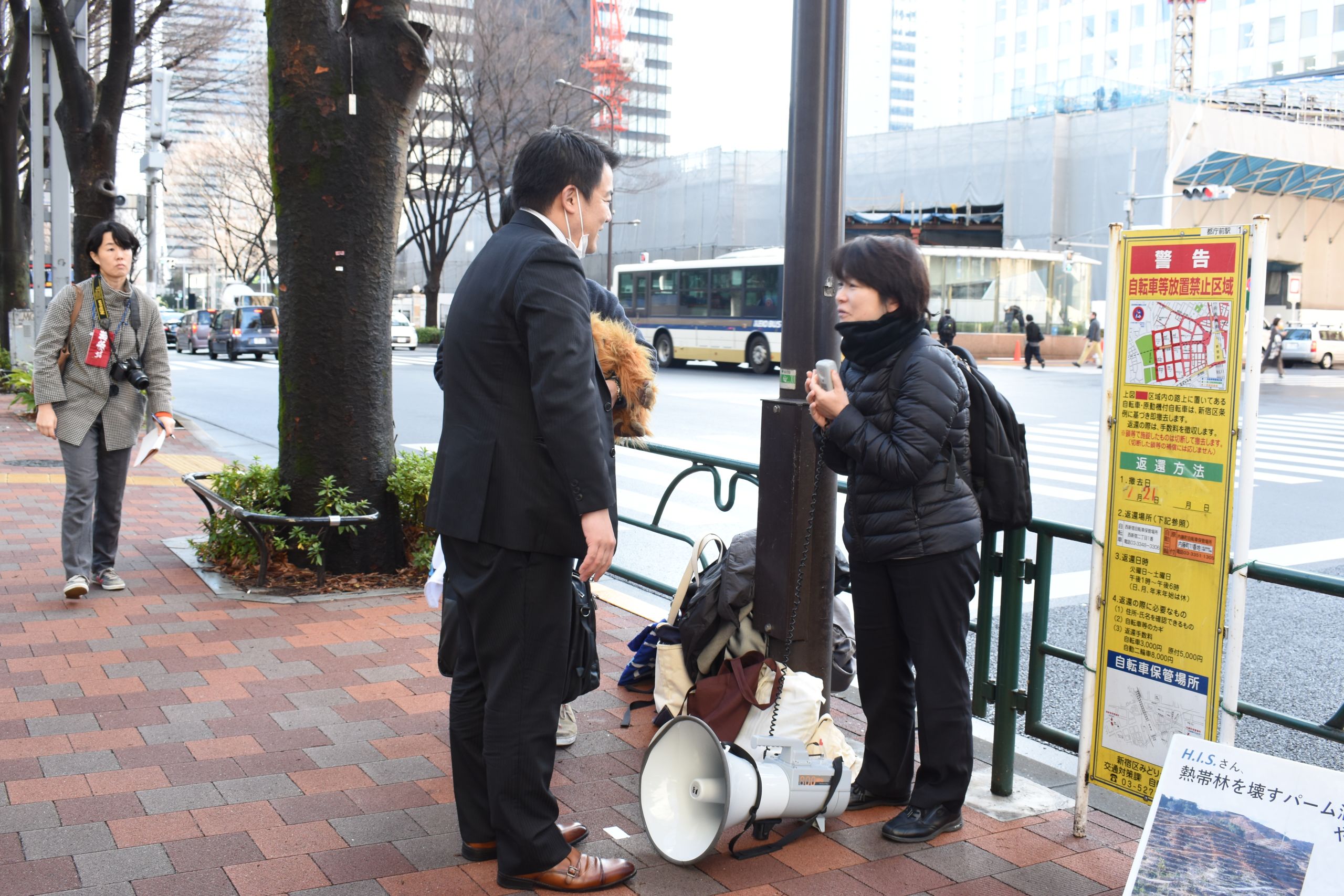

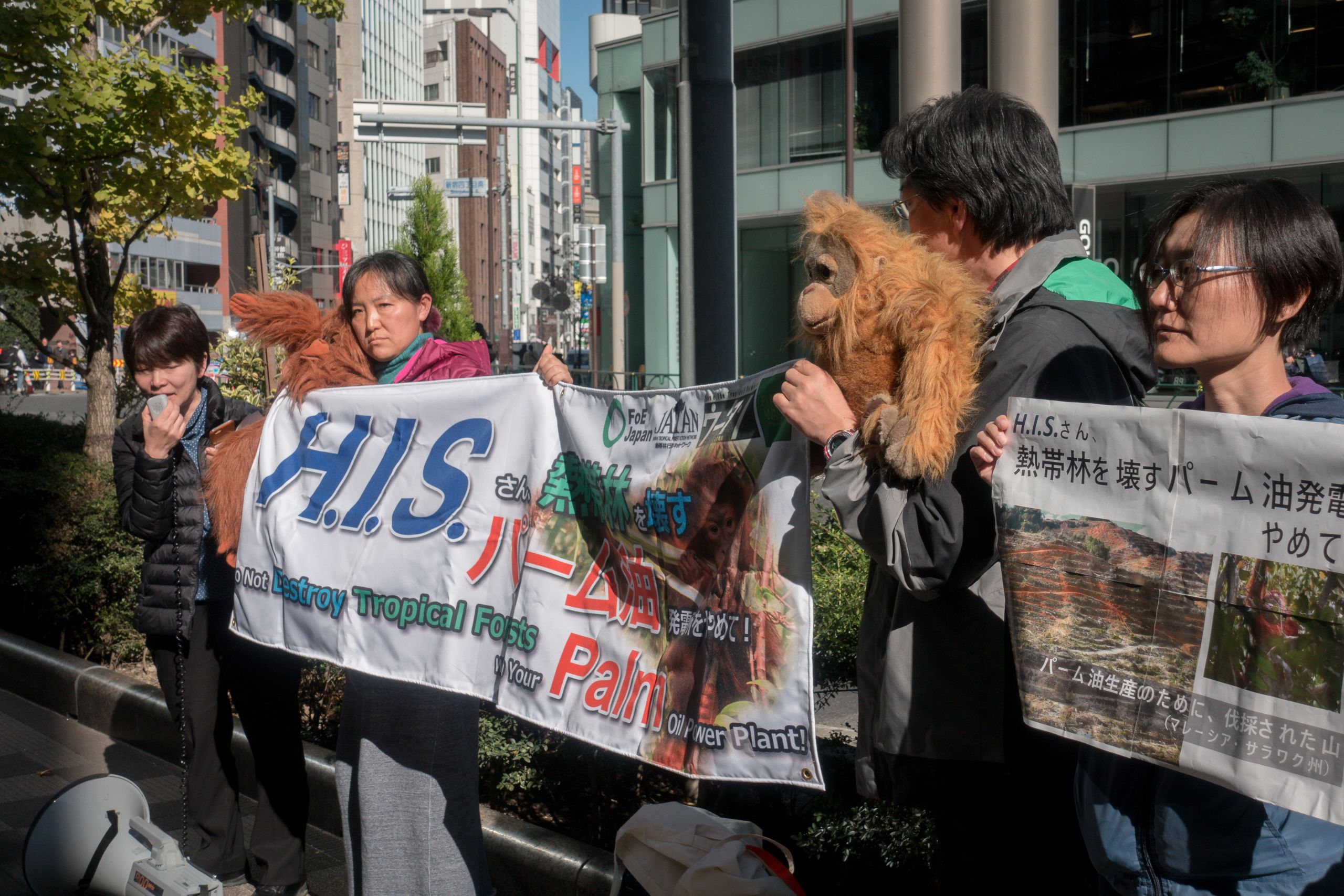



H.I.S.’s choice: Its Reputation or Palm Oil
Ironically, while H.I.S. may have entered the power business in an attempt to diversify their business ventures, they ended up doing so in a way which has damaged their brand and hurt their core travel business. It’s not too late to reverse the damage. H.I.S. can immediately halt construction of this power plant and repudiate any involvement in palm oil for power generation. There is precedent for this: in June, another large company, Hitachi Zosen, dropped its plans to build an even larger palm oil power plant in Japan after intense public opposition.
H.I.S. has a choice - they can once again be the fun and quirky travel company instead of being implicated in the destruction of tropical forests, deaths of endangered orangutans, and worsened climate emissions for a fuel even dirtier than coal. Environmentalists and concerned consumers have spoken: will H.I.S. listen?
Take Action: Sign the Pledge
"I pledge to not travel with H.I.S., stay at a H.I.S. robot hotel or other H.I.S. facility until the company completely ends its involvement in palm oil power generation. We need to protect endangered species like orangutans, and preserve tropical forests to fight climate change, save habitat, and help prevent future pandemics."

About Mighty Earth
Mighty Earth is a global environmental campaign organization that works to protect forests, conserve oceans, and address climate change. We work in Southeast Asia, Latin America, Africa, and North America to drive large-scale action towards environmentally responsible agriculture that protects native ecosystems, wildlife, and water, and respects local community rights. Mighty Earth’s team has played a decisive role in persuading the world’s largest food and agriculture companies to dramatically improve their environmental and social policies and practices. More information on Mighty Earth can be found at www.mightyearth.org/.
